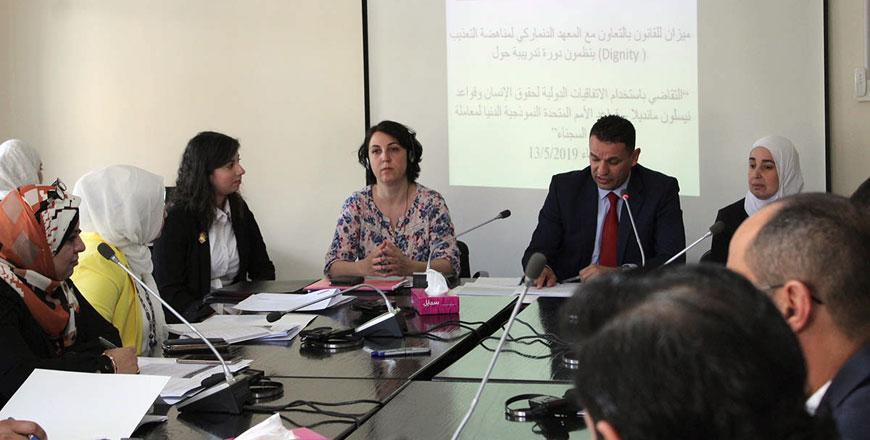You are here
Workshop calls for reducing inmate numbers in prisons
By Rayya Al Muheisen - Aug 01,2021 - Last updated at Aug 01,2021
AMMAN — A recent workshop to commemorate Nelson Mandela International Day, annually marked on July 18, has called to reduce the number of inmates in correctional and rehabilitation centres amid the pandemic and for applying alternative sanctions.
The workshop, held on Wednesday, was organised by Mizan Law Group in cooperation with the National Centre for Human Rights (NCHR) and DIGNITY - Danish Institute Against Torture.
The UN decided to extend the scope of this international day to help raise awareness for the conditions of imprisonment and promote prisoners as a part of society and the value of the prison staff, according to the UN website.
“Almost 18,000 people are in detention centres, while the capacity of the centres is 13,000. The latest statistics of the Public Security Directorate, issued on March 2021, stated that there have been 2,224 confirmed positive cases for COVID-19 in detention centres nationwide, with only one recorded death due to the virus,” Nahla Momani, the acting commissioner of the NCHR, told The Jordan Times.
She added that the government applied for a safety protocol during the pandemic to cut down the numbers of cases in the detention centres. The government ran regular PCR tests, in addition to regular sterilisation procedures.
The most significant accomplishment was producing face masks at one of the Kingdom’s rehabilitation centres during the pandemic, Momani added.
“The workshop was held in regard to the NCHR observations based on the report issued for the year 2019-2020, in their annual report for the third year in a row,” the Board of Trustees Secretary at NCHR, Saif Junaidy, told The Jordan Times.
The NCHR, along with the other partners, identified problems with the detention centres, such as overcrowding and limited healthcare services. The NCHR took steps to monitor detention facilities in the Kingdom and made several visits to detention centres to monitor the conditions of imprisonment, according to a NCHR statement.
“There are over 10 million people in detention centres around the world,” said Eva Abu Halaweh, the CEO of Mizan Law Group.
Halaweh added that respect for inmates’ rights is a part of the basic human rights. She added that placing inmates in detention centres does not take away their humanity; the aim for imprisoning people is to keep them away from making another mistake and to keep the community safe.
Regarding the pre-trial detainees, Halaweh said that they should be treated with the Presumption of Innocence or “suspect is innocent until proven guilty”.
COVID-19 has drawn a lot of attention to detention centres given that overcrowded prisons will increase the number of COVID-19 cases due to the inability of inmates to maintain physical distancing and the lack of virus prevention measures in place.
Alternative sanctions have been widely applied to ease overcrowding and mitigate the chance of the coronavirus spreading in prisons, Momani added.
Lubna Naser, Dignity’s regional director, said that the Karama programme, launched in 2008, has improved the living conditions of prisoners by eliminating the use of torture and other forms of ill-treatment in Jordan’s detention centres.
The programme has also worked to reduce pre-trial detention and to raise awareness about the rights of detainees and improve the conditions in the detention centres.
Related Articles
AMMAN — Activists and government entities involved in the third phase of Karama project that addresses torture and abuse claims vowed on Sun
AMMAN — Jordan’s expertise in the enforcement and implementation of international human rights treaties through incorporating them into the
AMMAN — Activists and government entities on Tuesday stressed the importance of securing justice for individuals whose rights were violated












